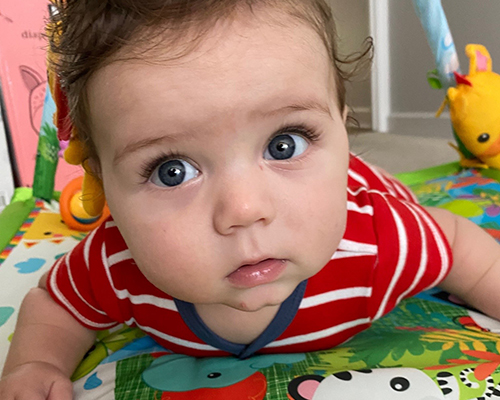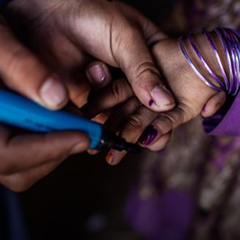
By Stephanie Graff
As the mother of a beautiful, happy, baby boy, I’ve been only too happy to share so many “firsts” with my husband and son.
From bath time to tummy time to bedtime stories, we recognize the importance of every milestone moment and experience, including those that are less than enjoyable for baby Abe – including routine immunization.
Perhaps because I work at Rotary International, I am particularly attuned to the important role immunization plays in preventing vaccine-preventable diseases, including polio. This is why my husband and I have been laser-focused on scheduling Abe for his routine immunization appointments (of which polio immunization is an essential component). Sticking to Illinois’ routine immunization schedule is not only critical to protect Abe’s health, it’s also necessary to ensure he can attend daycare.
Although Abe hasn’t particularly been a fan of getting jabbed in his chunky little legs, he’s handled his shots with as much bravery as an infant can muster at two-, four-, and six-month appointments. And the relief I’ve felt wash over me after each appointment is palpable.
When I heard the news this summer that an unvaccinated man in New York, USA, had been paralyzed from polio, I was disheartened that a disease we thought we had left behind here in the United States was again present. Although our pediatrician assured me that Chicago is generally very well immunized against polio, the idea that some parents choose not to immunize their children concerns me because it’s a decision that affects the communities they live in, above and beyond their families. When polio exists anywhere, it’s a threat everywhere. When children aren’t immunized, it contributes to creating an under-immunized community, ultimately increasing the risk this paralyzing disease could spread.
Immunizing my son is one thing I can easily do to protect him and the kids in his daycare class, so to me it’s an obvious choice. Misinformation about the safety or effectiveness of vaccines may cause some parents to avoid vaccinating their children. It’s also possible we have grown too complacent about the threat, since polio has not circulated in the United States for decades. But these things are reminders that we have work to do in educating communities of the threat of this disease. Vaccinations remain the only defense against polio and other vaccine-preventable diseases.
I have the honor in Rotary of working with polio survivors who share their stories in the hope of preventing polio from afflicting future generations of children. Their experience strengthened my resolve to vaccinate my son.
As we approach World Polio Day 24 October, I encourage you to tune into Rotary’s update to learn where we are at with our campaign to eradicate polio and why vaccinations are important.
https://blog.rotary.org/2022/10/17/a-new-parents-story-why-vaccines-matter/

